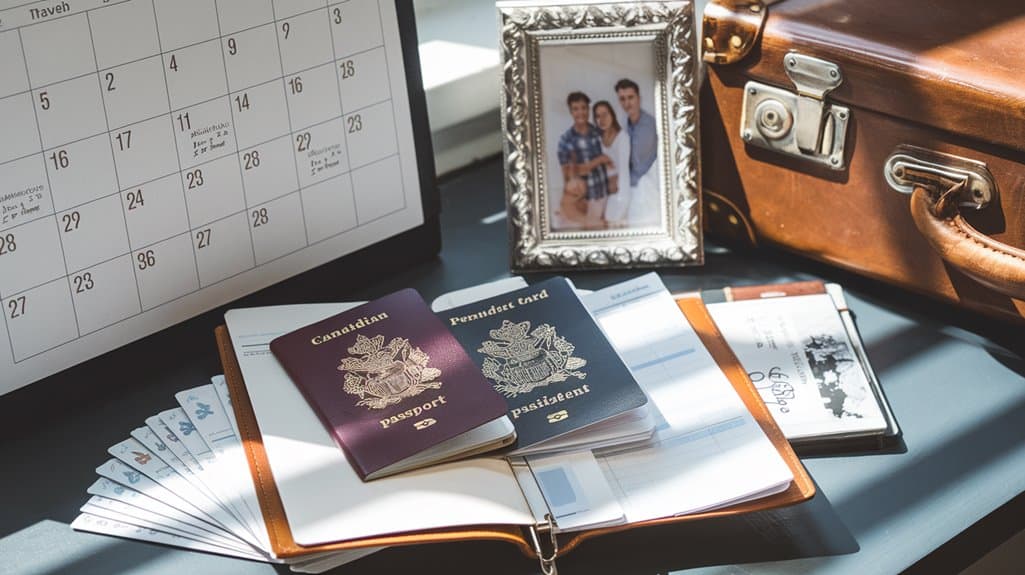
As a permanent resident of Canada, you’ll need to maintain your status by being physically present in the country for at least 730 days within any five-year period. These days don’t need to be consecutive, and certain activities outside Canada can count toward your residency obligation, such as working for a Canadian employer or accompanying a Canadian spouse abroad. Proper documentation of your whereabouts is essential, and understanding all qualifying activities can help protect your PR status.
Understanding the 730-Day Residency Rule
Canada’s 730-day residency requirement is a fundamental obligation that permanent residents must fulfill to maintain their status.
You’ll need to be physically present in Canada for at least 730 days within every five-year period, though these days don’t need to be consecutive. This means you can travel abroad while accumulating your residency days over time.
When calculating your residency obligation, you should track your time carefully.
Time spent outside Canada may count toward your residency requirement if you’re accompanying a Canadian citizen spouse or parent, working full-time for a Canadian business abroad, or accompanying a permanent resident spouse who’s working for a Canadian employer overseas.
It’s crucial to maintain proper documentation of your whereabouts, as you’ll need to prove compliance when renewing your PR card or re-entering Canada.
Qualifying Activities While Outside Canada
While residing outside of Canada, permanent residents can still maintain their status through specific qualifying activities that count toward the 730-day residency requirement.
You’ll meet these obligations if you’re working full-time for a Canadian business or public service abroad, or if you’re accompanying a Canadian citizen spouse, common-law partner, or parent outside the country.
Similarly, if you’re accompanying a permanent resident spouse or common-law partner who’s working for a Canadian business abroad, this time also counts toward your residency requirement.
To claim these qualifying activities, you’ll need to maintain proper documentation, including employment contracts, marriage certificates, or proof of relationship.
Time spent during holidays or vacation periods while employed by a Canadian business also counts toward your residency obligation.
Documentation and Record-Keeping Requirements
Maintaining detailed records of your time in and outside Canada is essential for protecting your permanent resident status. You’ll need to keep thorough documentation of your travel dates, including boarding passes, passport stamps, and travel itineraries.
It’s recommended to maintain a travel journal or spreadsheet that tracks your entry and exit dates. For time spent working abroad, keep copies of employment contracts, assignment letters, and pay stubs from Canadian employers.
If you’re accompanying a spouse or family member, document their status and relationship through marriage certificates, employment records, or citizenship papers. Store digital copies of all documents, and organize physical copies chronologically.
Immigration officers may request these records when you renew your PR card or re-enter Canada, so having organized, readily available documentation will help prove you’ve met your residency obligations.
Exceptions to Physical Presence Requirements
The physical presence requirement of 730 days in Canada offers several important exceptions that can help permanent residents maintain their status even when living abroad.
If you’re accompanying a Canadian citizen spouse, common-law partner, or parent outside Canada, your time abroad counts toward the residency requirement.
Similarly, if you’re working full-time for a Canadian business or in public service while stationed overseas, this time qualifies as presence in Canada.
The same applies if you’re accompanying a permanent resident spouse or common-law partner who’s employed by a Canadian company abroad.
Permanent residents who accompany their PR spouse working for Canadian employers overseas can still maintain their residency status.
These exceptions guarantee you won’t lose your PR status while supporting family members or contributing to Canadian interests internationally.
Maintaining Status During Extended Absences
For permanent residents planning extended time abroad, it’s crucial to take proactive steps to protect your status in Canada.
Start by documenting all your travel dates, including entries and exits, in a detailed travel journal. Keep records of employment contracts, housing arrangements, and financial ties to Canada.
If you’re working for a Canadian employer overseas, obtain written confirmation of your employment status and assignment details.
You’ll need to maintain strong connections to Canada through property ownership, bank accounts, or family relationships.
Consider filing Canadian tax returns even while abroad, as this helps demonstrate your continued ties to the country.
If you’re accompanying a Canadian spouse or working for a Canadian company, make sure you have documentation to prove these qualifying circumstances.
Impact of Non-Compliance on PR Status
When permanent residents fail to meet their residency obligations, they face serious consequences that can jeopardize their status in Canada. If you don’t maintain the required 730 days of physical presence within a five-year period, you’ll need to address this non-compliance during your PR card renewal or when attempting to re-enter Canada.
Failing to meet Canada’s residency requirements of 730 days within five years puts permanent resident status at serious risk.
- You may receive a formal determination that you’ve failed to meet your residency obligations.
- Your PR card renewal application could be rejected.
- You might be denied entry when trying to return to Canada.
- You could lose your permanent resident status after an appeal process.
If you’re concerned about meeting your residency requirements, it’s essential to maintain detailed records of your time in Canada and seek legal advice before your status is at risk.
Strategies for Meeting Residency Obligations
Meeting your Canadian residency obligations requires careful planning and consistent documentation of your time spent in and outside the country.
You’ll need to track your days meticulously using a travel journal or calendar, keeping all relevant travel documents like boarding passes and passport stamps. If you’re planning extended periods abroad, verify they fall under permitted exceptions, such as working for a Canadian company or accompanying a Canadian spouse.
You can maximize your residency days by scheduling longer stays in Canada when possible and carefully timing necessary international travel.
Consider using a spreadsheet or residency calculator to monitor your accumulated days. When working abroad, maintain strong ties to Canada through property ownership, bank accounts, and regular visits to demonstrate your ongoing commitment to permanent residency.
Renewing Your PR Card Successfully
Successful permanent resident card renewal builds directly on your diligent residency tracking efforts. To guarantee a smooth renewal process, you’ll need thorough documentation of your time in and outside Canada, along with evidence of any qualifying exceptions to physical presence requirements.
- Keep detailed travel records including passport stamps, boarding passes, and a chronological log of all international trips.
- Maintain proof of Canadian residence such as tax returns, employment records, and housing documents.
- Document qualifying time abroad through employment contracts or proof of accompanying a spouse.
- Submit your renewal application well before your current PR card expires, ideally 6 months in advance.
Remember that border officers may scrutinize your travel history when you re-enter Canada, so accurate documentation is essential for maintaining your status.
How Canadian Currents Immigration Can Help
Professional guidance with your permanent residency matters is readily available through Canadian Currents Immigration’s experienced team of lawyers, consultants, and paralegals.
Our team members bring decades of combined experience in immigration law and will work directly with you to navigate residency obligations, PR card renewals, and status determinations.
We’ll assess your specific situation and develop tailored solutions to help maintain your permanent resident status.
Whether you’re dealing with complex residency calculations, preparing documentation for PR card renewal, or need assistance with provincial nomination requirements, we’ll provide efficient and cost-effective legal services.
Our expertise guarantees you’ll understand your obligations and options while receiving the support needed to maintain your permanent resident status in compliance with Canadian immigration law.
Frequently Asked Questions
Can Maternity Leave Spent Outside Canada Count Towards the Residency Requirement?
Maternity leave spent outside Canada doesn’t automatically count toward your residency requirement unless you’re accompanying a Canadian citizen spouse/parent or working for a Canadian employer while abroad.
How Do International Business Trips Affect the Calculation of Residency Days?
Your international business trips can count toward residency days if you’re working for a Canadian company or public service abroad. Keep detailed records of travel dates and employment documentation to verify these days.
What Happens if My PR Card Expires While I’m Outside Canada?
You’ll need to apply for a Permanent Resident Travel Document (PRTD) to return to Canada. Without valid PR documentation, you can’t board a flight or enter Canada legally.
Can Time Spent Studying Abroad at a Foreign University Count Towards Residency?
Time spent studying at a foreign university doesn’t count toward your residency requirement. You’ll need to physically be in Canada or meet specific exceptions like working for a Canadian company abroad.
Does Working Remotely for a Canadian Employer From Abroad Satisfy Residency Obligations?
Working remotely abroad for a Canadian employer doesn’t typically count toward your 730-day residency requirement. You must be physically present in Canada or working full-time on-site for a Canadian company overseas.
Conclusion
You’ve learned how essential it is to meet Canada’s 730-day residency requirement within any five-year period. By understanding qualifying activities, maintaining proper documentation, and tracking your time carefully, you’ll protect your PR status. Whether you’re working abroad for Canadian employers or accompanying family members overseas, staying compliant with these obligations guarantees your path to continued permanent residency or future citizenship remains secure.

We serve ALL of Canada. Currently have offices Western Canada — Vancouver, Calgary, Edmonton, Kamloops and Red Deer. We also have the infrastructure to work with any of our clients virtually — even from the furthest regions of the Yukon to Newfoundland.
Call (778) 331-1164 [toll free 1 (844) 715-0940] to get routed to the best office for you or contact us online to schedule an appointment.
We also have a dedicated intake form to help you get the ball rolling. Our intake team will review your specific case and advise you on the next steps to take as well as what to expect moving forward.
Our offices are generally open 8:30 a.m.—4:30 p.m., Mon—Fri.

Aleksandra Koscielak
IMMIGRATION CONSULTANT
With an exceptional record of success in immigration consulting and business strategy, Aleksandra brings extensive expertise as a senior licensed immigration consultant. Her deep understanding of business strategies and processes enables her to advise executives on the best immigration solutions confidently.



